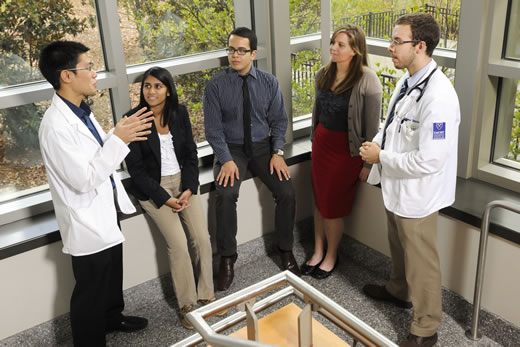When Eduardo Garcia was growing up, in El Paso, Texas, he often went with his grandmother to her doctor's appointments to help interpret for her.
Having recently emigrated from Mexico, Garcia's grandmother was still learning English, and her young grandson would give her the highlights of what the doctor was saying. However, these years later as a chemistry major at Emory, Garcia realizes that his attempts at interpretation were flawed. "I should have translated word for word," he says. "And some things were too personal to communicate. The situation needed an unbiased third party who could interpret."
Garcia's insights come after more than two years of working to help establish the Emory University Volunteer Medical Interpretation Services (EUVMIS). One of the first service-learning programs in the country to train graduate and undergraduate students as medical interpreters, EUVMIS grew out of observations by medical students and undergraduates who volunteered at free clinics in Atlanta. There never seemed to be enough medical interpreters to go around at these primary care clinics that serve a diverse and international community of the working poor.
The medical students who ran the clinics played catch as catch can and drew in anyone with foreign language skills—particularly in Spanish—to help. But untrained, ad hoc interpreters have error rates that average between 50% and 75%, according to Howard Chiou, an MD/PhD student who banded with other students from throughout Emory's graduate and undergraduate schools to see if they could marshal the resources to meet the big need.
These two years later, after two pilot phases, hours of consulting with legal counselors, developing partners with professional training groups and local clinics, fundraising for program support, and overcoming what the students say was a "huge learning curve," EUVMIS is officially launched. Supported by a three-year seed grant from the Office of the Executive Vice President for Health Affairs in the Woodruff Health Sciences Center and funding from the anthropology department's Global Health, Culture, and Society program, the EUVMIS also has formalized a three-year commitment by Grady Memorial Hospital's Department of Multicultural Affairs to give the student volunteers practical training in medical interpretation.
"The EUVMIS project is a much needed program," says Sandra Sanchez, who directs multicultural affairs at Grady. "It will address language barriers and especially benefit those health organizations that serve low-income, uninsured, and homeless patients in Atlanta."

